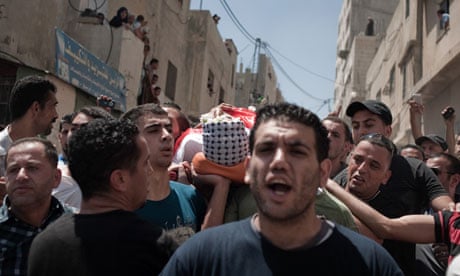Three Palestinians shot dead by Israeli security forces in a West Bank refugee camp were buried in a tempestuous funeral on Monday as Palestinian negotiators cancelled talks in a sign of the fragility of the embryonic peace process.
The men were killed during an early morning raid to arrest a suspect in Qalandiya camp. At least 15 others were wounded, six of whom were in a critical condition in hospital in Ramallah.
Israeli security forces said border guards had retaliated after being attacked by up to 1,500 people hurling rocks and stones after they entered the camp before dawn.
Thousands of people flocked to the camp for the funeral following noon prayers. Masked militants from the al-Aqsa Martyrs Brigade fired AK47s into the air as an imam told the crowd through loudspeakers at the cemetery: "Israel does not want peace; they want to shed our blood."
Shops in the area remained shuttered as youths set fire to car tyres and threw stones and molotov cocktails at the nearby Qalandiya checkpoint, the main gateway in the imposing concrete wall between the West Bank and Jerusalem.
The fourth round of talks between Israeli and Palestinian negotiators, scheduled to take place in Jericho on Monday evening, was cancelled in the aftermath of the shootings.
A spokesman for the Palestinian president, Mahmoud Abbas, said the deaths were "a clear message of the true Israeli intentions toward the peace process". Nabil Abu Rudeineh added: "There are going to be negative repercussions to these acts."
The Palestinian foreign minister, Riyad al-Malki, said there was "no doubt that what happened this morning will have an effect" on negotiations.
Hanan Ashrawi, a member of the Palestinian negotiations steering committee, said in a statement: "Israel's use of excessive and indiscriminate violence and live ammunition in densely populated civilian areas represents a blatant violation of international and humanitarian law."
She called on the international community "to take serious measures to bring an immediate end to the killing of innocent civilians and to terminate Israel's impunity".
The Israeli military said the guards were acting in self-defence.
"During a night-time incursion of security forces … they were met with violent and disorderly conduct by hundreds of Palestinians who attacked them," it said in a statement. "When they felt immediate danger to their lives, they opened fire at the attackers."
But witnesses claimed that at least two of the three victims were bystanders.
Robin al-Abed, 32, was shot in the chest as he tried to get from his home to his workplace, and Jihad Asslan, 20, was pronounced brain dead after being shot on the roof of his house where he had gone to watch the clashes, said a neighbour of the men, Abu Omar Hammad. The third dead man was Younis Jahjouh, 22, who was also shot in the chest.
Hammad, 46, who sells sweets in the camp, said he had been woken by his children at 6am to find "soldiers smothering the neighbourhood". He said he saw al-Rabed shot as he tried to get to his job with the UN Palestinian refugee agency, Unrwa.
"He was not throwing stones. The soldiers opened the back door of their jeep and shot him in the chest. The bullet came out of his back and he was puking blood. I called an ambulance, but it was prevented from entering the camp," he said.
"I've seen many incursions in this camp, but this was different. They came to kill."
Fadi Mateer, 27, was hit in the arm while trying to hide next to the camp's mosque. He said: "At first I thought it was a family dispute – a lot of the time you hear the sound of guns in the camp. But then there was shooting everywhere. While I was hiding, I saw a guy leaving his house to go to work and, boom, they shot him. Normally at this time, children are going to school and people are going to work, but everyone was trying to hide."
At the Ramallah hospital where Mateer went for treatment, "there was blood covering the floor", he said. He had doubts whether the peace process could continue: "The Israelis are cheating us. If they wanted peace, they wouldn't have raided the camp."
Mahmoud al-Aloul, governor of the city of Nablus and a member of the central committee of Fatah, the ruling faction in the West Bank, who was among the mourners, said: "We are in pain and grief. The Israelis don't want a peace process so they create a diversion. We need to reconsider our strategy. If we fail to protect our people we will lose their respect."
Hatim Khatib, whose brother Youssef was the target of the raid, said troops dressed in plain clothes arrived at their home at 4.30am.
"After half-an-hour we started hearing shooting from the soldiers inside our house, and then people started throwing stones at them," he told Associated Press. Youssef was arrested after he returned from morning prayers. He said he did not know why his brother was arrested but said he had previously been jailed for throwing stones and was released three years ago.
